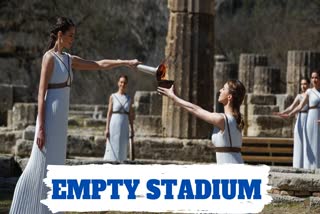Greece: The Olympic torch handover is set to take place in an empty Athens stadium amid the coronavirus outbreak, Greece's Olympic Committee said on Sunday.
File video of Olympic torch in Athens stadium The handover of the Olympic Flame to the Tokyo organising committee will take place at the stadium in Athens where the first modern Olympics were held in 1896.
The torch was lit this week at the birthplace of the games in Ancient Olympia in a pared-down ceremony designed to reduce the risk of coronavirus transmission.
The committee said the decision was taken in coordination with the health ministry and the International Olympic Committee.
Meanwhile, Japan Prime Minister Shinzo Abe on Saturday said that the country is still preparing to host the Olympics, though there is a rising global concern about the viability of the Sumer Olympics due to COVID-19 pandemic.
Abe and his government have been adamant the Olympics will go ahead, even as other global sporting events have been put on hold. Speculation about a delay from the July start date has grown since US President Donald Trump said organisers should consider a one-year postponement.
Due to COVID-19 pandemic 2020 Olympics schedule could be altered Abe and Trump held a call after those comments, prompting the U.S. president to say on Twitter that the Olympic venue was magnificent. But this may not be enough to assuage sponsors of the Games, who are increasingly nervous about how the impact of the outbreak on the competition.
The Olympic Torch relay, in which the Olympic flame typically starts a tour around the host nation, is due to start in the Japanese prefecture of Fukushima in less than two weeks.
"We will overcome the spread of the infection and host the Olympics without problem, as planned," Abe told a news conference in Tokyo, adding that delaying or cancelling the Olympics was "not a subject at all" in his call with Trump.
He said Japan working closely with the International Olympic Committee, which will have the final decision whether the Games go ahead, and the U.N. World Health Organization, suggesting he accepted that Tokyo would not ultimately decide on the event.
